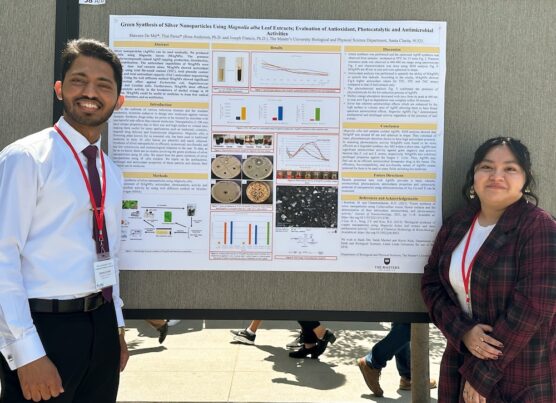By Josephine Lee
For aspiring scientists at The Master’s University, taking up a student research project is no small commitment. But it’s also a key opportunity to turn classroom studies into real discoveries under the guidance of experienced faculty. This year, Dr. Ross Anderson is helping three teams conduct exciting projects in the fields of molecular biology and microbiology.
Anderson taught at TMU for 25 years, carrying out dozens of research projects in his time as a professor of biochemistry. Despite officially retiring last spring, Anderson is continuing to mentor the next generation of researchers.
“I know these students, and I respect them, and I want to see them achieve their goals,” he said. “And part of that is research.”
One team, led by senior pre-medicine student Michelle Kwong, is testing a nucleotide analog that could be effective in preventing viral infections at the cellular level. Previous students found the analog effective against bacteria; this year’s team will test the inhibitor against common human viruses.
“It’s exciting, because we have the ability to look into real diseases and real solutions, using novel research,” says Jack Bird, senior pre-medicine student and a member of the research team. “We’re basing our research off of projects from last year — their results look very promising, and so we’re going further.”
Another group of students is continuing a project begun by team leader and pre-veterinary medicine senior Shaveen Del Mel, investigating the potential antiviral properties of Magnolia-silver nanoparticles against bacteriophages. If successful, their research could prove valuable for medicine, even in combating cancer.
Last year, alongside Thai Perez (’23), Del Mel was able to identify silver’s natural antifungal and antimicrobial properties. The team’s poster presentation, submitted to the West Coast Biological Sciences Undergraduate Research Conference, won a research award in the field of microbiology. Del Mel intends to submit their new findings to this year’s upcoming conference.
Junior pre-medicine student Steve Cingapagu is leading a team in studying the production of an enzyme called lactate dehydrogenase (LDH), which is expressed in five isoforms by different body tissues. His team is attempting to use in situ hybridization to identify if individual cells express different isoforms of LDH.
“One of these forms of LDH is critical in certain types of cancer,” Cingapagu said. “So understanding what causes this form to be produced over other forms could allow us in the future to potentially develop cancer drugs that impede its production.”
With all of his teams, Anderson hopes students will gain the practical skills and experience to succeed in medical school and graduate school. But in the process, they also absorb his passion for the subject, dedication to quality research, and unfaltering encouragement.
“He teaches us like a father would teach his kids,” said Shaina Job, a senior studying cellular and molecular biology. “I feel like there’s more depth to that. I’m enjoying all my teammates — they’re so much fun, and it’s encouraging to see how they help me learn. I love the experience.”
For the latest news about TMU and its students, visit masters.edu/news.
Like this:
Like Loading...
Related





 Tweet This
Tweet This Facebook
Facebook Digg This
Digg This Bookmark
Bookmark Stumble
Stumble RSS
RSS
































REAL NAMES ONLY: All posters must use their real individual or business name. This applies equally to Twitter account holders who use a nickname.
0 Comments
You can be the first one to leave a comment.